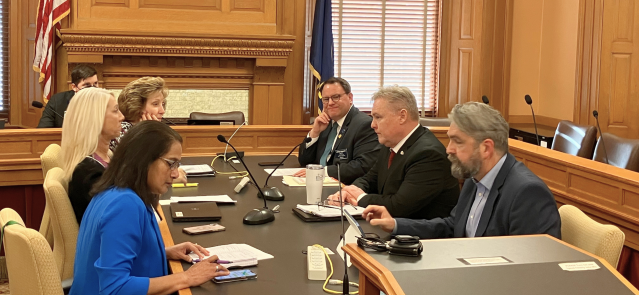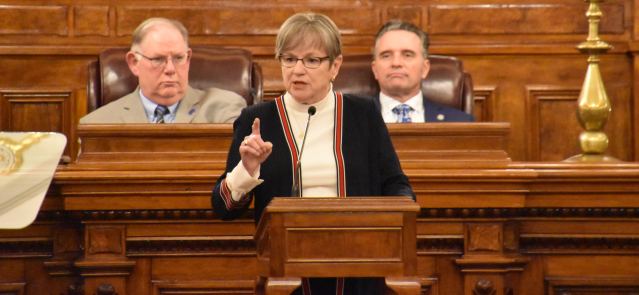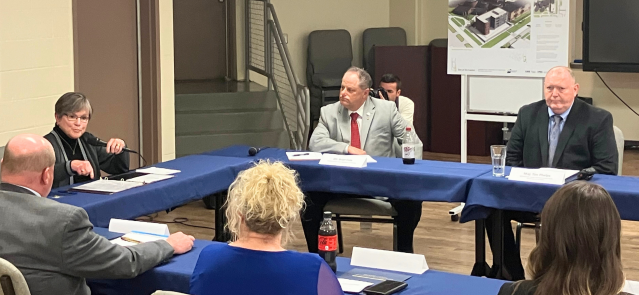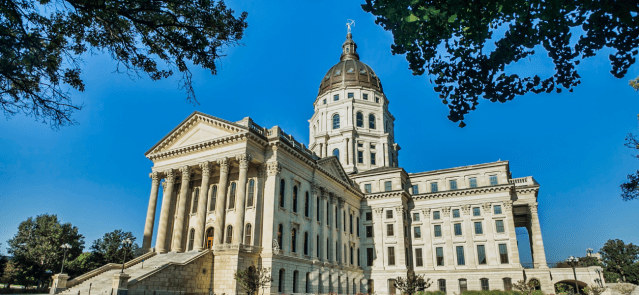Stay ahead of the curve as a political insider with deep policy analysis, daily briefings and policy-shaping tools.
Request a DemoInternet age-verification bill makes its way through House
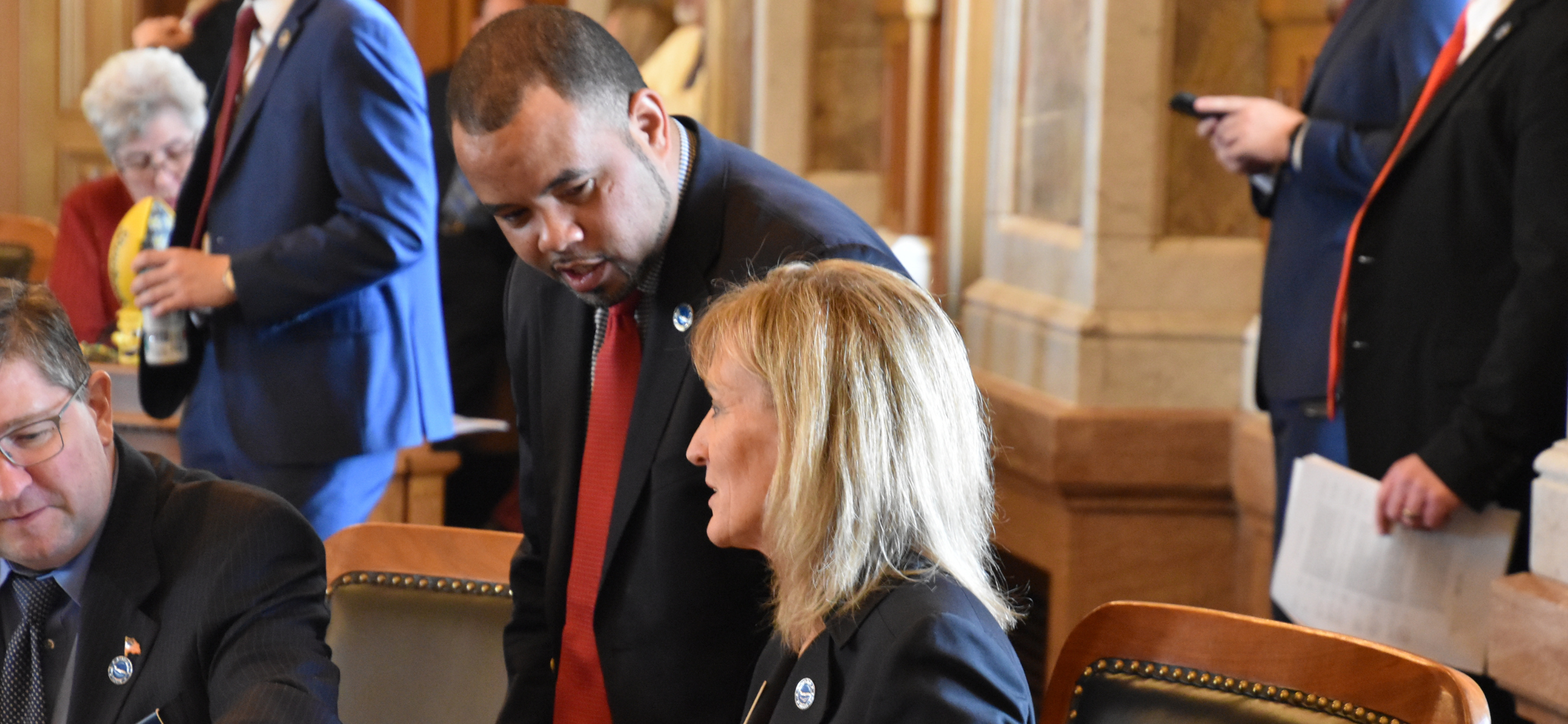
Reps. Patrick Penn and Susan Humphries talk March 25, 2024, on the House floor. (Credit: Bryan Richardson)
Websites displaying pornography may soon be required to implement age-verification software to block Kansans under 18 from viewing its content.
The age-verification requirement for Senate Bill 394, which received preliminary approval on the House floor Monday, is mandatory if one-fourth of the content displayed by a website for a calendar month is considered “harmful to minors” — meaning the content depicts “nudity, sexual conduct, sexual excitement, or sadomasochistic abuse.” The Senate passed the bill 40-0 on Feb. 15.
Websites that Attorney General Kris Kobach deems in violation of the bill are subject to civil penalties of up to $10,000 per underage visit.
During Monday’s hearing, Rep. Rui Xu, D-Westwood, had concerns about the bill’s perceived “vagueness.” Xu asked whether “homosexuality” was specified in the bill as harmful content. As an example, he inquired whether a website listing of the “Top 10 most gay-friendly cities” or “Top 10 most gay-friendly colleges” would run afoul of the bill.
Rep. Susan Humphries, R-Wichita, said she didn’t think Ru’s hypothetical scenario fit the bill’s definition of harmful content. But Xu said he was merely attempting to illustrate the potential for unintended consequences resulting from the legislation.
Rep. Patrick Penn, R-Wichita, said SB 394 and House Bill 2592, a companion bill he introduced on the House side, are “reasonable and proper.” After proclaiming to be a “reasonable guy,” Penn reiterated that the bill is exclusively designed to shield minors from harmful content and that “we need to keep adult material before adult eyes only.”
“I can tell you that nothing in this bill will preclude any adult from looking at all the nasty material that their heart desires,” he said.
Penn argued that on average, children first “stumble upon porn” by the age of 12. He also contended that children are being inundated with “soft porn.”
“At every commercial [and] every single time they turn on YouTube or the internet,” he said. “It’s not like TV was in days of old.”
Penn also sought to tie the bill to sex trafficking.
“We know that many of those individuals who are trafficked in the human sex trade show up on these [porn] websites,” he said.
Rep. John Carmichael, D-Wichita, argued that if “mainstream pornography providers” complied with the bill, it would result in more frequent visits to the “dark web” — websites that are not indexed via conventional search engines.
“And once they get on the dark web, they will find a whole bunch of other terrible things that you don’t want your children looking at,” he said. “Things that are far more harmful to your child than pornography.”
As an alternative to the legislation, Carmichael suggested that parents need to do a better job of monitoring their children’s internet usage.
In written testimony to the Senate Judiciary Committee last month, John Idoux, Brightspeed’s director of governmental affairs for Kansas, said the legislation is “too vague to be enforceable” — and “given the real-time nature of the internet, the definition of ‘harmful to minors’ cannot be implemented in any sort of automated manner.”
Also providing testimony, Iain Corby, executive director of the London-based Age Verification Providers Association, said the bill is “geographically targeted to affect only residents of and visitors to the state of Kansas.”
“Other bills we have reviewed arguably sought to extend their reach beyond their state borders, again creating constitutional concerns,” he said.
A final vote on the measure is slated for Tuesday.
Matt Resnick is a Statehouse reporter at State Affairs Pro Kansas/Hawver’s Capitol Report. Reach him at [email protected].
X: @StateAffairsKS
Facebook: @stateaffairsks
LinkedIn: @stateaffairspro
Know the most important news affecting Kansas
Get our free weekly newsletter that covers government, policy and politics that impact your everyday life—in 5 minutes or less.
Unlimited Access: Subscribe for just $2.99/mo billed monthly.
Subscribe NowGet unlimited news access
Already a member? Login here
Ready for a ‘scoop and score’: Legislature takes first step in bid for Chiefs, Royals
The Kansas Legislature hopes a last-minute bill will lure two major Kansas City professional sports teams — the Chiefs and Royals — to the Sunflower State. Jackson County “dropped the ball,” Rep. Sean Tarwater, R-Stilwell, said of the failure of a ballot initiative to pay for renovations at Arrowhead Stadium and a downtown baseball complex. …
Kelly vetoes tax cut bill, proposes new package
Gov. Laura Kelly vetoed the tax cut package Wednesday, setting up an override attempt when the Legislature returns. Kelly said the bill was unsustainable and that Kansas “must be mindful of the fiscal mistakes of the previous administration” when providing tax relief. “While I appreciate the bipartisan effort that went into this tax cut package …
Amid final Medicaid Expansion push, Kelly visits Shawnee County jail
Making a final push for Medicaid expansion this session, Gov. Laura Kelly visited the Shawnee County Adult Detention Center on Tuesday. She met with Brian Cole, director of the Shawnee County Department of Corrections, Deputy Director Tim Phelps and others to explore how expansion could benefit local jails. Medicaid expansion “would mean a lot,” Cole …
Government entities converge for inaugural Child Welfare Summit
All three branches of government converged Monday in downtown Topeka for the inaugural Child Welfare Summit. The event, which organizers said drew about 750 people in person and virtually, centered on the framework of Kansas’ foster care system and the myriad challenges faced by those involved with child welfare services. Senate President Ty Masterson, R-Andover, said in opening remarks that the Legislature’s top priority is its handling of “children in need of care.” “Jesus himself said, ‘The poor are always …

